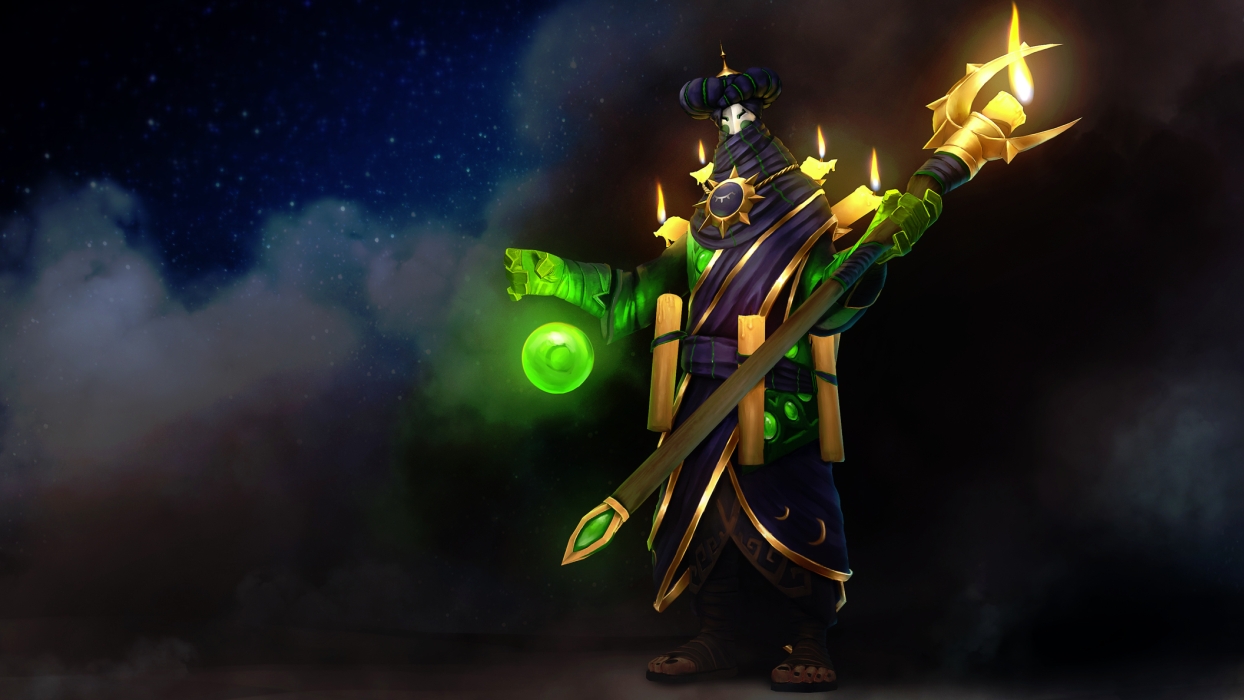Why Rubick represents the best of Dota 2

Every week, Chris documents his complex ongoing relationship with Dota 2 and wizards in general. The artwork above comes from the loading screen for the Garb of the Cunning Augur, a set for Rubick by Es'Kophan.
To read more Three Lane Highway, click here.
Last week’s column was a little negative, and not without reason. Dota 2 is still working through a bunch of issues associated with the launch of Reborn—balance-wrecking bugs, instability, missing features, and so on. The patches are arriving at a pace, but my own rate of play has slowed while I wait for things to stabilise. Launching a pro gaming channel didn’t do much good for my Dota schedule, either.
This week, then, I want to talk about something positive—a hero that I’ve always loved, but who hasn’t had much love from me in this column. At least, not as much as Axe—and yes, I love them both equally, please don’t make me choose.
Rubick is one of the most distinct, disruptive and entertaining characters in Dota. He’s proof that Dota 2 thrives on chaos in a way that other games, even other MOBAs, don’t. He should be completely broken. In some cases, he is completely broken. That he works at all, let alone as well as he does, is a testament to the uniquely graceful way in which Dota makes weirdness work.
Modern MOBA design values characters that have ‘kits’ of abilities that slot together in specific ways, that form combos that can be executed with varying degrees of skill to fulfill a specific role. Lots of Dota heroes fit this pattern too. Rubick, however, is a character built around a single ability: Spell Steal. Ability theft is his reason to be, the reason you pick him, and the reason he’s special. Look at the rest of his skills: a reliable (though unusual) disable; a nuke and debuff; a moderately helpful aura. Prior to level 6, he’s most of the way to being an unremarkable support. Slap any other ult on him and you’re the rest of the way there.
But Rubick’s ult isn’t just ‘any other ult’. It’s not even ‘Spell Steal’, really, though that’s what you invest your skill points into. Rubick’s ult is every other spell in the game.
This is an idea that is very difficult to implement when characters are designed with lots of internal synergy. Instead it requires an environment, like Dota’s, where spells can be taken out of context and still function—more or less. There are great steals and terrible steals, even game-breaking steals: as in the case of that poor Rubick who stole Morphling’s Morph, turned all of his strength into agility, lost the ability to change it back, and had to spend half of the game with 170hp. In the fountain. Dying to Sunstrike. (Warning: old. Also: MLG as shit.)
Dota 2 walks a very fine line between being weird and being broken, and while Reborn might have tilted the scale towards the latter I love that stuff like this is possible. I love that the possibility for strangeness is valued just as highly as the need for a game that is reliable or balanced. The irony here is that in a genre where character ideas are traded and stolen back and forth all of the time, Rubick—a character about stealing—is one of the few to remain unique to his game of origin. Only Dota 2 is janky and complicated enough to support him.
The biggest gaming news, reviews and hardware deals
Keep up to date with the most important stories and the best deals, as picked by the PC Gamer team.
Janky and complicated though he may be, though, he’s not a novelty or joke character. Despite—no, because of his distinctiveness—Rubick offers a huge amount at every level of the game. He’s unreliable, technically, but his unreliability can be overcome with raw skill and good judgement. If Dota 2 drafting often comes down to a debate between dependable power and knife-edge bravado, Rubick is one of the few support characters to fall into the latter category. He’s the support that gives support players a chance to show off, to surprise their enemy, their team, and anybody watching. He’s the support that lets fy-god be fy-god.
Rubick is a wildcard character, and I mean that in a literal sense. He’s an asterisk, the * you include in a command when you want to leave space for a random variable. You could, if you liked, reduce another support’s contribution to the game down to a run of keywords: Lion might end up as ‘STUN/HEX/MANA DRAIN/NUKE’. You can’t do that with Rubick, really. You’ve always got to leave some room at the end for chance, for chaos, for the unexpected. He represents a willingness to risk disaster in pursuit of something crazier, something more exciting. When it comes down to it, that’s what I love so much about this game.

PC Gamer Pro is a new channel dedicated to esports and competitive gaming. Check back every day for exciting, fun and informative articles about League of Legends, Dota 2, Hearthstone, CS:GO and more. GL HF!
Joining in 2011, Chris made his start with PC Gamer turning beautiful trees into magazines, first as a writer and later as deputy editor. Once PCG's reluctant MMO champion , his discovery of Dota 2 in 2012 led him to much darker, stranger places. In 2015, Chris became the editor of PC Gamer Pro, overseeing our online coverage of competitive gaming and esports. He left in 2017, and can be now found making games and recording the Crate & Crowbar podcast.


